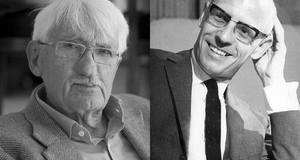Featured Article:Defining the Legitimacy and Power of the State Through Weber and Foucault
By
2016, Vol. 8 No. 05 | pg. 1/2 | »
KEYWORDS:
As a founder of sociology, Max Weber influenced the social sciences immensely. In his “Politics as a Vocation,” Weber claims that one of the definitions of the state is its ability to employ legitimate violence as a means of control in a given territory.1 He also claims that one can define the state as being a human community where people struggle with one another for what is ultimately a greater share of the power to apply legitimate force.2 But, should one only support Weber’s claims despite the fact that states also employ knowledge as a means to preserve their power?3 This paper will first describe Weber’s views on legitimacy, his definitions of the state, and the forms of legitimation which he claims justifies his definitions. Next, by drawing from the works of Foucault I will suggest that there are other forms of power that states' use to assert their authority. Lastly, I will argue that the power the state has, through the use of institutions, to employ and perpetuate knowledge as a means of coercion, can be understood to be another essential piece in defining the concept of the state, which I believe Weber’s “Politics as a Vocation” seems to miss. Weber claims that the state’s legitimacy rests on the chance that people will follow its commands as a given source of power.4 In other words, a state’s legitimacy depends on the probability that those within in it will, in theory, abide by all of its commands. How do states accomplish the task of ensuring that its people will obey its decrees? Weber states that people submit to the authority of the state because of factors that range from simple habit to very specific desires for advantage.5By using knowledge and not just physical force to assert power, as reasoned by Foucault, the state positions itself to perpetuate and increase control over its people through the process of normalization. Furthermore, because personal interests play a role in sustaining obedience within the state, one may claim that there is a purposive element to being obedient.6 Weber seems to support this claim when he states that those who have ulterior motives, or intentions for personal gain, have an interest in obeying the state since it is the source that can grant them their wants.7 Hence, because one may gain what they view to be an advantage by obeying the state, it follows that they recognize the state as legitimate since they accept it as the source of command and power that can grant them the advantages they seek to obtain.8 Also, Weber claims that obeying the state is a result of, but not solely due to, people’s habit to do so, their affection for the state, and for the intricate interests that they may gain from obedience to it.9 Hence, as a source that is customarily accepted, the state can maintain a person’s feelings of loyalty, and it can fulfill the desires of its members, which Weber believes legitimates it because it alone is independent of politics, or the struggle for a piece of the state’s legitimate power.10 Furthermore, Weber claims that the belief in the legitimacy of the state is akin to how a worker, who is a member of a workplace, acquiesces to the rules of his/her employer to receive the right of payment.11 To him, just as a worker is a member of a place of work and gives up of some of his/her freedoms to gain money, a subject, who is a member of a state, gives up a piece of his/her freedom to gain the benefits of living within a human community.12 Though it does not seem that Weber wholeheartedly ascribes to social contract theories, he nevertheless claims that it is a possibility and that it does reflect social arrangements of old.13 Finally, with this outline of Weber’s views on legitimacy, the reader may now understand his definitions of the state and the forms of authority that he claims it employs to maintain its legitimacy. According to Weber, a defining characteristic of the state is its total domination over the right to use legitimate force to assert its legitimacy within its domain.14 In other words, Weber believes that the state can coerce people under its jurisdiction with its potential to employ the means of authority, or legitimate violence to achieve the goal of maintaining and asserting its authority.15 Because only the state monopolizes, or controls the means to achieve an end that only it can fulfill, Weber believes that the state is the sole entity that can legitimately assert its power by the use of might.16 An example to help clarify what Weber is trying to convey, would be if the Pope, who Catholics believe, is the sole representative of Christ, and thus, infallible after his ascension to the throne of St. Peter, used his infallibility as a way to justify and assert the purity of his papal decrees. Thus, just as the Pope, who Catholics believe, is infallible, can use his legitimate claim on purity to justify the pureness of his decisions, the state with its sole right to use the means of authority, or legitimate violence, justifies its authority through asserting its authority.17 Furthermore, Weber claims that though other institutions use force to coerce people, it is not unique to them, and rather it is limited to the amount of authority that the state allows other institutions to possess.18 Also, because the state not only controls, but also distributes the legitimate use of power, Weber continues to claim that the domination of one person over another, or of one group or institution over another, in a given territory, is another definition of the state.19 In other words, Weber defines the state as a human community where struggles for dominance between those who have power, and those who power controls occurs.20 He then claims that this struggle for control over the legitimate use of power is the definition of politics.21 Finally, since the state allows for struggle and because those who succeed at struggling come to gain a greater share of the state’s power; those who come to hold authority must provide justifications for their right to use legitimate force as a technique to preserve the state's authority over its people.22 Weber asserts that three forms of authority define the means used by the state to affirm the validity of its legitimacy. One form of authority that justifies the validity of the state’s legitimacy is its tradition.23 Tradition, in Weber’s view, is a form of legitimation that the state uses to assert the validity of its authority.24 Also, the foundation for traditional authority rests on the claim that the state has been legitimate for a very long time and that its customs and norms assert its legitimacy because they too have existed for a long duration.25 To better grasp what Weber means, one should think of the custom of crowning a king or queen. I refer the reader to such an example because a coronation is a traditional custom of a kingdom that asserts the kingdom's authority. One may make this claim because as a practice that people in a kingdom accept and expect, due to its long-standing history, coronations are understood as being only in the power of the state to perform legitimately. Thus, just as a coronation is only in the state’s right to perform legitimately, due to it being a convention that the state has performed throughout its history, the state that derives from tradition, justifies its potential to use its authority due to its historical control over the means to assert its authority.26 Another form of authority that asserts the validity of the state’s legitimacy is charismatic leadership. According to Weber, if a state has legitimate authority over its people, and if the basis for that power predominantly derives from the devotion people have to obey their leader, then it is a prime example of a state that is dependent on a charismatic figure of authority.27 He also believes that ‘charismatic’ domination derives from a population that perceives their leader to be virtuous and deserving of their dedication.28 Furthermore, because people perceive their leader’s charisma as being the basis for the validity of the state’s legitimacy, one may infer that they also view their leader as a virtuous person who they understand has an inner calling to lead.29 Also, Weber claims that the supporters and friends of a charismatic leader orient their interests to be in line with his/hers because they genuinely believe in the allure of their leader’s personal qualities.30 Hence, because a charismatic leader is someone that many people favor, and due to them believing in his/her devotion to the state, it follows that the validity of a state’s authority under a charismatic leader is dependent on their charisma.31 Finally, Weber continues his piece by describing how authority that derives from rules is another mode of validating the state’s legitimacy. Weber believes that states also employ the use of reason, order, and law to assert the validity of their legitimacy.32 He calls this form of authority rational-legal authority, and its fundamental feature as a continuous organizational body which executes its official functions within the boundaries of the state’s rules is its focus on a systematic division of specified labor which demands competence.33 Furthermore, this form of authority, which features a hierarchical system of leadership, and thus, featuring lower-ranked civil servants, higher-ranked civil servants, and an executive leader, demands loyalty not to the leader, but rather to the idea, or impersonal order that validates the legitimacy of the state.34 Also, the guidelines for potential leaders of a society in a state that is predominately legitimized by rational-legal authority includes specialized forms of training and having to follow a code of conduct that derives from technical rules as well as norms.35 Weber continues to claim that once an individual is an official of the state, and hence, can be an authority in one of the state’s various organizations; it is improper for them to own the means of economic production or the means of administrative power.36 Also, rational-legal authority validates the state's legitimacy, because by separating its officials into different subordinate groups based on their competency in a particular field, none can gain total power over the state.37 Hence, by allowing none to monopolize the means of economic or state power, one may infer that rational-legal authority not only thrives on the administrative expertise of officials, it also thrives off of a government structure that limits the power of officials through the legitimacy of law.38 Another theorist, Michel Foucault, defines the state in other ways than Weber. According to him, raison d’état, or the reason of the state, is something that one can analyze so that they may learn more about what only the state can legitimately do.39 In Foucault’s view raison d’état is also an integral component needed to understand the state because it is the rationality in which leaders refer to, knowingly or not so that they may govern effectively.40 Also, at the same time, one should note that Foucault does not believe that there is a transcendent, natural, or subjective force that guides leaders.41 Rather the decisions of past leaders and the very structure of the state apparatus leaves certain options open that officials of the state are left to choose from to protect the state’s interests.42 Furthermore, to better understand the political realities of the present, Foucault claims one should analyze and trace the thought patterns that were dominant in a state’s past so that they may gain a clearer understanding of the modern state and the reasons for why it acts now.43 With this methodological outline in mind, I will now describe Foucault’s understanding of the state and his views on what role knowledge plays within it. In Foucault’s view, the modern state is a product of territorial sovereigns helping to craft a well-disciplined space.44 What he means by this is that regulations of social milieus, territorial limits, and territorial borders, are all coordinated by leaders, so that there is a general motion of, namely, people and merchandise in a state’s space.45 Furthermore, by constructing the form of the modern state, leaders helped the features of the state to become an objective reality that people interact with.46 To Foucault, the means used by modern states to assert their authority first came into being with its power to control the prices of basic foodstuffs, especially grain, and its total control over the ability one had to store it, which helped to assert the state’s authority over its land.47 Hence, because the land is under the jurisdiction of the state, it becomes assumed that the right to store and export what results from cultivating it, i.e.; food, is within the state’s control.48 Also, to defend against fluctuations such as the scarcity of food, states’ found ways to protect themselves by turning economic theories into real practices, such as the case with the state’s initial embrace of the commercial practice of mercantilism in the past.49 To Foucault, the anti-scarcity practice that the state had believed and once used to prevent famine, and its unfortunate economic and political effects, was the system of mercantilism.50 In theory, mercantilism was believed to work, since it could limit the realities of food shortages by putting foodstuffs on the economic market as quickly as possible, which was believed to allow for an ample circulation of goods.51 Thus, because, in theory, goods were moved at a more than adequate rate, one may claim that unless the flow of goods stopped, mercantilism could continually stifle famine even before it could occur.52 On the other hand, by also prohibiting a person's ability to export, hoard, raise prices on, and cultivate certain goods, states which used mercantilism, were prone to experience sharp economic fluctuations.53 Furthermore, because the defects of mercantilism can cause dismal economic realities, such as severely inflated prices for goods including food, which can thus lead to famine, the state, was open to suffering from population unrest and revolt.54 Therefore, dismal economic realities, which are key reasons why revolutions occur, renders the state open to the threat of revolutionary uprisings that could challenge its legitimacy and authority.55 Finally, to remedy this threat, the state looked towards new ideologies to turn into economic practices that could help to continue to maintain and perpetuate the legitimacy and authority of the state.56 According to Foucault, after the failure of mercantilism, the leaders of modern states started to fix their states’ problems in numerous ways.57 First, state leaders revised the mercantilist principles that had failed at the economic level.58 They did this by allowing their people to set prices for, hoard, and trade food.59 Those who governed lifted these prohibitions on the control of foodstuffs, to not only avoid political unrest and famine but to also gain more money for the state.60 Leaders reasoned that the state would benefit from taking a more laisser-faire approach to its political economy, because, with greater freedoms for merchants, there were prospects for competition and profits to surge.61 Hence, to Foucault, the apparatus of the state, by allowing people the liberty to have more control over their grain, caused a new raison d’état to emerge.62 Lastly, Foucault calls this new mode of understanding and practicing political economy, liberalism.63 Foucault claims that in a liberal economy, people are free to set prices for their goods since it helps them to avoid damaging their livelihoods.64 Furthermore, by people setting the price for grain, helps the state to avoid economic disaster, since in times of good harvest, when prices for grain are low, it follows that the freedom one has to price manipulate can raise the price of grain.65 Also, when grain prices are higher, it indicates that there was a bad harvest and that the supply of grain does not match its demand, yet since the state by allowing all to hoard grain, ensures that the market for grain is not severely damaged.66 Additionally, to keep the market for grain stable, the state allows grain merchants to impose import taxes on foreign grain to balance prices domestically, and to freely export goods that can reach new sources of consumers.67 Thus, by the state liberalizing its economy through allowing its people to price manipulate, save goods, and to move and trade goods, the state was able to ensure that its people would live financially stable lives.68 Furthermore, one may claim that by helping its people elude poverty, the state’s interests in avoiding major political unrests became easier for it to achieve.69 Hence, there were ways in which liberalism influenced the political course of the modern state after the era of mercantilism.70 One way that liberalism affected the political sphere of the state was the emergence of a population which is different and more intricate than a simple mass of people.71 To Foucault population is the predicament members of a state are in, where they act as components needed to perpetuate and maintain the state, and thus, there is a distinction between them as members of the state and them as individual producers for the state.72 To further show this distinction, one may refer to the differences between feudal subjects of the state and citizens of the modern state.73 Feudal subjects, by being only members of the state, were forced to toil the land for their feudal lord, who in turn paid tribute to the state’s sovereign.74 Unlike feudal members of the state, a population consists of people who are free to pursue a career of their liking.75 The freedom one has to choose their occupation creates two roles they have to fill; one that is obedient to the state, as a member, and one that is a free contributor to the state, as part of the population.76 Also, since a population is free to pursue the careers they like, the state is not only in a position to earn more money, but it must also use more innovative techniques to ensure that its population will remain politically docile while economically active.77 Before an analysis of the techniques used by the state to ensure political and economic obedience, one should first understand the power of political positions and the interests they tend to represent. To Foucault, positions of government, are not only positions that can give rise to state projects, but they also are products of the state’s government structure and its raison d’état.78 In other words, civil servants and political leaders not only shape the logic of the state, but their positions also exist due to the design and needs of government, which derives from the thought structures that have led to them.79 To him, the modern political positions that one may come to fill derives from a long line of intellectual discourse that culminated in the inception, and the existence of political occupations in the modern state.80 Furthermore, raison d’état, or the logic of government, does not just exist in the ideal, it is also evident in institutional and governmental practices.81 Consequently, Foucault claims that there are reasons that influence the ‘mentality’ of the state, such as those deriving from issues concerning its political economy, which he claims is a key factor in the course of action that states take to ensure their longevity.82 How do states ensure that their political economies will continue to thrive? Foucault claims that it is through techniques of security and targeting populations to coerce them into fulfilling the political/economic objectives of the state.83 Hence, because of the importance political economy plays in the structuring of a state’s needs, one must analyze why the state turns certain economic theories into commercial practices, that it alone can regulate, which, in turn, helps to legitimize the state and its methods of authority.84 The techniques used by the state to ensure that its people will remain politically obedient and economically involved is not of a typical master-slave relation, but rather the power to secure and discipline people in a state derives from a process Foucault calls normalization.85 One way in which the state facilitates normalization is by linking law with what people consider to be normal, which bolsters the state's security.86 Foucault believes that because systems of law have an intricate tie to systems of norms, it follows that the state by codifying laws that reflect what it and its people consider as being normal helps to secure the legitimacy and authority of the state.87 He makes this claim because the state, with its ability to punish through the guise of normalized laws, secures itself from political uprisings by governing in line with the consent of its people, even though this consent is not of their making alone.88 In other words, the state as a source of power, influences normalized laws just as much as people do, because the legal apparatus of the state impacts how people understand those laws and behave according to them.89 Hence, because the state coerces people to conform to its normalized law system, with the threat of punishment, the state secures itself from unrest with greater ease.90 Finally, the process of normalization also applies to the implementation of discipline.91 Also, the normalization process of discipline breaks down individuals, places, time, actions, movements, and operations, so that the state can classify the attributes of definite objects, such as people, with greater ease.92 The state’s ability to manage people also leads to questions such as those concerning the best course of action the state can take to accomplish its tasks.93 Thus, because disciplinary normalization has the power to influence people to conform to an ideal model of normal behavior so that the state may achieve certain ends, Foucault claims that it is in the interests of the state to perpetuate normality through the law.94 With the use of the law, which justifies the state to stop its people from being abnormal, or unable to conform to its normalized ways, it follows that institutions arise to correct people's supposed abnormalities.95 Also, the state disseminates its power, so that normalization and discipline, through the means of institutions which appear to be apolitical, such as prisons, workplaces, schools, and hospitals, can occur.96 Yet, institutions are political because they have the ability to gain economically from those they discipline, and, in turn, the state can also gain financially from organizations that help to shape people into being more docile.97 Furthermore, Foucault claims that institutions all have certain characteristics that one can label as falling under different categories of normalized discipline.98 At the same time, though distinct, institutions all feature economic, educational, and medical aspects, which are, to a degree, used for political ends.99 One political end that Foucault claims the state achieves, by using institutions to obtain sophisticated and precise information about those who defy the state, is it can leave institutions to correct the behavior of those disobedient individuals, so that they may reenter society as productive members of the economy.100 Another political benefit that the state gains from obtaining information about those who disobey it, is that it gains power over those perpetrators with its ability to monitor them.101 Hence, because the state exerts influence over institutions that help to discipline people, it follows that institutions with their ability to provide the state with information on especially those they claim cannot conform to society, gives the state an intellectual form of authority over its people.102 Finally, the state’s ability to obtain knowledge, so that it can, in theory, use it as a means to discipline any individual that is under its control, shows that the state’s power over the use of information is key to it successfully disciplining its people.103Continued on Next Page » Suggested Reading from Inquiries Journal
Inquiries Journal provides undergraduate and graduate students around the world a platform for the wide dissemination of academic work over a range of core disciplines. Representing the work of students from hundreds of institutions around the globe, Inquiries Journal's large database of academic articles is completely free. Learn more | Blog | Submit Latest in Sociology |


















